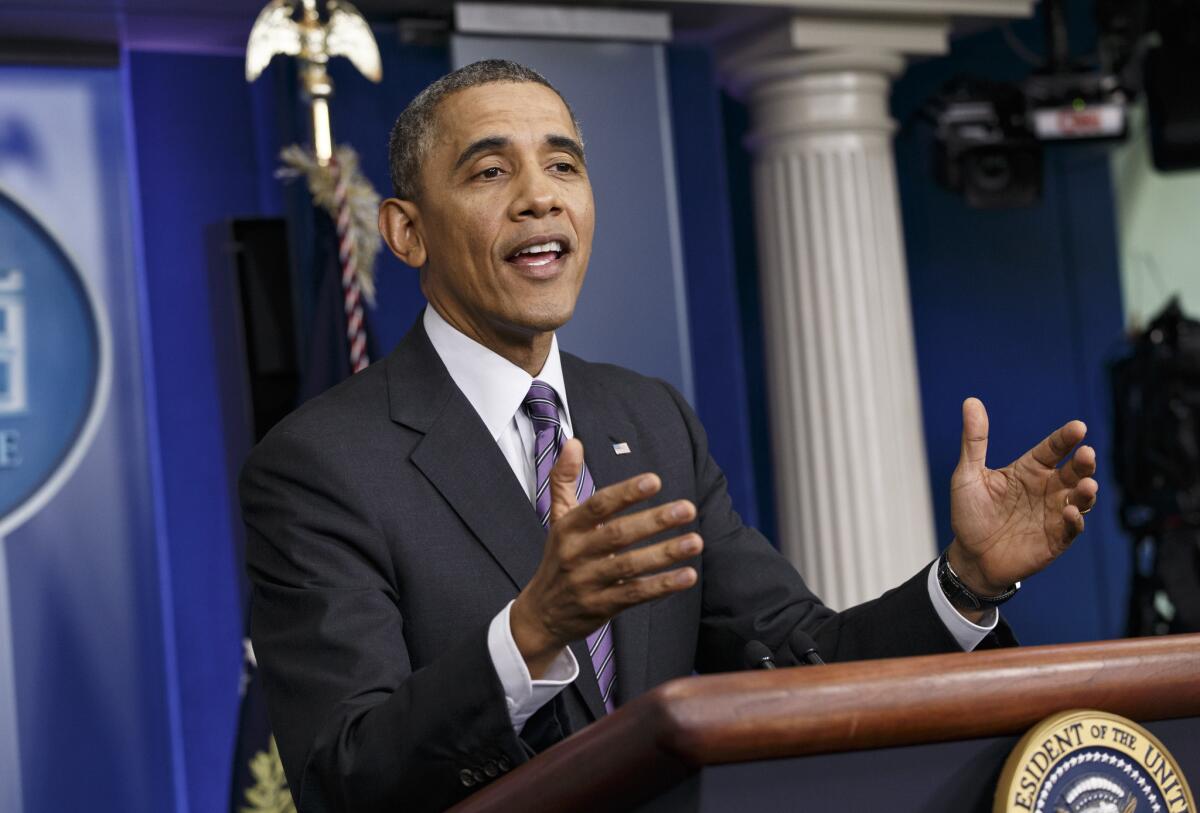What Americans really want in a foreign policy

- Share via
To understand how President Obama feels about the frustrations of foreign policy in an uncooperative world, just look at his testy response to a question from a Fox News reporter last week.
Are critics wrong, the reporter asked, to say that America’s global position is marked by “weakness”?
“Most of the foreign policy commentators that have questioned our policies would go headlong into a bunch of military adventures,” Obama replied.
“Proponents of what I consider to be a disastrous decision to go into Iraq haven’t really learned the lesson of the last decade, and they keep on just playing the same note over and over again,” he continued.
Instead, Obama argued, he is trying to “steadily advance the interests of the American people” without using force.
“That may not always be sexy,” he said. “But it avoids errors. You hit singles, you hit doubles. Every once in a while, we may be able to hit a home run.”
But there are two problems with what the president said.
The first is that most of his critics aren’t demanding that he go to war in Syria or Ukraine. Yes, many of them argue that the United States should send weapons to Ukraine’s army and Syria’s rebels, but that’s a long way from advocating a rush to war.
The second problem is that the president ducked the critics’ chief complaint: that his aversion to all forms of military intervention, even indirect ones, has emboldened malefactors like Russia’s Vladimir Putin and Syria’s Bashar Assad to test the limits. That’s a legitimate worry, and much of the public appears to share it, according to recent public opinion polls.
It’s true that after Iraq and Afghanistan, Americans have no appetite for more military adventures. A Pew Research Center poll last year found that 52% said the United States should “mind its own business” overseas, the highest percentage to endorse that proposition since the question was first asked in 1964.
But as foreign policy scholar Robert Kagan noted recently, there’s a paradox in those polls: The same public that wants to stay out of foreign entanglements also thinks the president isn’t doing a very good job on international affairs. A recent NBC-Wall Street Journal poll found that only 38% of those surveyed approved of Obama’s handling of foreign policy; that was fewer than approved of his handling of the economy.
Why the apparent contradiction?
Kagan suggests that Americans are psychologically conflicted. “They may want a narrowly self-interested American policy,” he wrote. “But they’re not proud of it, and they’re not grateful to [Obama] for giving them what they want.”
I think the explanation is a little simpler: Yes, Americans want to stay out of foreign messes, but they also want to see their country’s foreign policy succeed. And at the moment, Obama is suffering from a shortage of successes. Whatever he’s doing, it isn’t working. Russia is still threatening Ukraine. Syria is still mired in bloodshed. Secretary of State John F. Kerry’s thankless mediation between Israelis and Palestinians seems doomed.
To which Obama replies: Hey, you can’t always swing for the fences. Sometimes, singles and doubles — what baseball fans call “small ball” — are the best you can do.
But wait a minute. This is a president who used to say we could swing for the fences. We could repair America’s relationships with its allies, enjoy a “reset” with Russia, embrace the Muslim world and make peace just about everywhere.
The failures call to mind the question a famous Alaskan foreign policy analyst once asked: “How’s that hopey-changey thing working out for ya?”
Obama’s initial foreign policy of engagement fell short. The world turned out to be a harsher place than he’d hoped. But the problem now is that the president hasn’t laid out a clear new strategy in place of the outmoded old one.
Now that engagement has faltered, the strongest message of U.S. foreign policy is one of disengagement, and not only from Iraq and Afghanistan. Obama has been eloquent about the things he doesn’t want to do: get sucked into Syria, send troops or military supplies to Ukraine. But what does he want to do? That’s not as clear.
It’s still possible that, with lower expectations, Obama’s foreign policy can succeed — modestly, with singles and doubles. No swinging for the fences anymore — a focus, instead, on avoiding errors.
It’s even possible (to continue the president’s baseball metaphor) that he’s merely a hitter in a temporary slump. If economic sanctions persuade Putin to keep Russian troops out of Ukraine, that will be a low-cost success. If talks with Iran produce a nuclear agreement, that will be a major success. Peace between Israel and the Palestinians? Nobody really thought that had a chance, which is why it was entrusted to Kerry, not Obama.
But if the president wants Americans to admire his less-ambitious foreign policy on the way to those not-yet-achieved successes, he’s going to have to explain it better. And not just in cranky outbursts when reporters ask him why nothing seems to be going right.
Twitter: @DoyleMcManus
More to Read
A cure for the common opinion
Get thought-provoking perspectives with our weekly newsletter.
You may occasionally receive promotional content from the Los Angeles Times.










